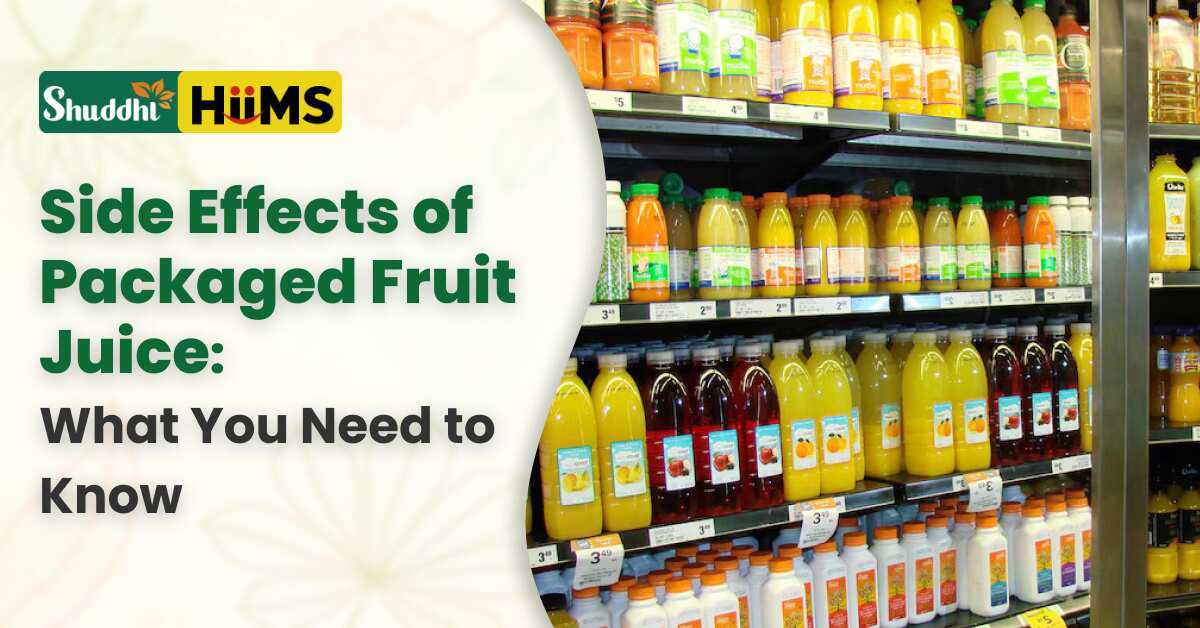Side Effects of Packaged Fruit Juice: What You Need to Know

20 May, 2025
Side Effects of Packaged Fruit Juice: What You Need to Know
Many people consider fruit juices convenient and healthy drinks. They promise vitamins, natural sweetness, and a refreshing taste. However, when it comes to packed juice, things are not always as simple as they seem.
In this article, we will explore the side effects of packaged fruit juice, address questions like why packed juice is bad for you, and compare fresh juice vs packed juice to help you make informed choices.
Is Packed Juice Unhealthy? The Hidden Truth
Packaged fruit juice may look natural, but the juice content is often much less than expected. For example, one kilogram of lychee fruit yields only about 100 to 150 ml of juice, yet you might find large packs of juice sold cheaply that claim to be 100% lychee juice. These juices usually contain water, sugar, artificial colouring or flavouring, and diluted juice.
These added ingredients can be harmful. Some dyes used in packaged juice are not natural and may have toxic effects on the liver and kidneys if consumed regularly. The various additives and sugars in processed foods can contribute to both blood sugar trouble and weight gain.
Side effects of packaged juice include:
- Exposure to microplastics
- Increased sugar intake, leading to potential blood sugar spikes
- Possible allergic reactions due to artificial flavors or preservatives
- Digestive issues like bloating or acidity
- Potential long-term effects on liver and kidney health
Fresh Juice vs Packed Juice
The comparison between fresh juice vs packed juice is important for anyone aiming to make healthier choices.
Fresh Juice
- Made from fresh fruits with no additives
- Contains natural fiber (if not completely strained)
- No preservatives or artificial colors
- Rich in natural vitamins and minerals
- No microplastics or chemical contaminants from packaging
Packed Juice
- May contain added sugar, preservatives, and artificial colors
- Usually lacks natural fiber due to processing
- Potential contamination from plastic packaging (microplastics)
- Often diluted with water and additives
- Longer shelf life but reduced nutritional value
When you drink fresh juice, you are consuming nutrients as nature intended, without any hidden chemicals or plastics. On the other hand, packed juice prioritizes shelf life and taste over nutrition.
Exploring Better Drink Choices
If you’re looking to avoid the downsides of packed juices, there are plenty of natural alternatives that hydrate and nourish without added sugars or chemicals. Drinks like coconut water provide a natural source of electrolytes, while herbal teas and fruit-infused water add flavor and freshness without any hidden additives. These options support your health while keeping your hydration interesting and enjoyable.
Natural Alternatives to Consider:
- Coconut water for natural hydration
- Herbal teas such as chamomile or green tea
- Water infused with lemon, cucumber, or mint
Practical Tips to Avoid Side Effects of Packaged Fruit Juice
- Prefer Fresh Juice: Whenever possible, choose freshly squeezed juice made at home or from fresh fruit stalls.
- Check Ingredients: Always read labels carefully and steer clear of juices that include added sugars, synthetic colors, or preservatives.
- Limit Packaged Juice Consumption: Treat packed juice as an occasional treat, not a daily habit.
- Use Reusable Containers: Store juice in glass or steel bottles instead of plastic to reduce microplastic exposure.
- Try Natural Alternatives: Fermented drinks like homemade kanji or beetroot juice are traditional options with less processing.
How Packed Juice Affects the Planet
Packed juice isn’t just a health concern; it also impacts the environment. Most juices come in single-use plastic packaging, which contributes significantly to plastic pollution.
By choosing fresh juice made from local fruits or storing your drinks in reusable glass bottles, you can reduce plastic waste and help protect the planet. Small, mindful choices add up to a big environmental difference over time.
Read More Info: Fever treatment without medicine
Conclusion
The side effects of packaged fruit juice are real and should not be ignored. While they may look healthy on the shelf, packed juices often contain microplastics, chemicals, and sugars that can harm your body over time. When comparing fresh juice vs packed juice, fresh juice clearly comes out ahead in terms of health benefits.
By understanding why packed juice is bad for you and being aware of the risks, you can make smarter choices for your health. Keep in mind that natural, minimally processed foods and drinks are always better for your body.
FAQs
1. Why is packed juice bad for you?
Packed juice can contain microplastics, added sugars, and artificial chemicals that may affect your health negatively over time.
2. Is packed juice unhealthy?
When compared to fresh juice, packed juice often has lower nutritional value and may carry hidden health risks.
3. Packed juice Good or bad?
Packed juice is convenient but has several health drawbacks; fresh juice is generally a better choice.
4. What are the side effects of packaged juice?
Possible effects include microplastic contamination, blood sugar spikes, digestive discomfort, and long-term organ stress.
5. Fresh juice or packed juice, what’s the better choice?
Because fresh juice has more natural nutrients and no microplastics or chemicals, it is healthier.






1 comment
Food Research Lab
Name: Food Research Lab Phone: +91 9566299022 Disease: Nil Comment: Great insights on the hidden side effects of packaged juices. It's crucial for consumers to be aware of what goes into these products. Food research labs like ours play a key role in developing healthier beverage alternatives by improving formulations, reducing harmful additives, and ensuring nutritional quality through scientific testing and innovation. This supports both consumer health and product success in the market. We help food businesses solve this at FRL. Happy to connect!